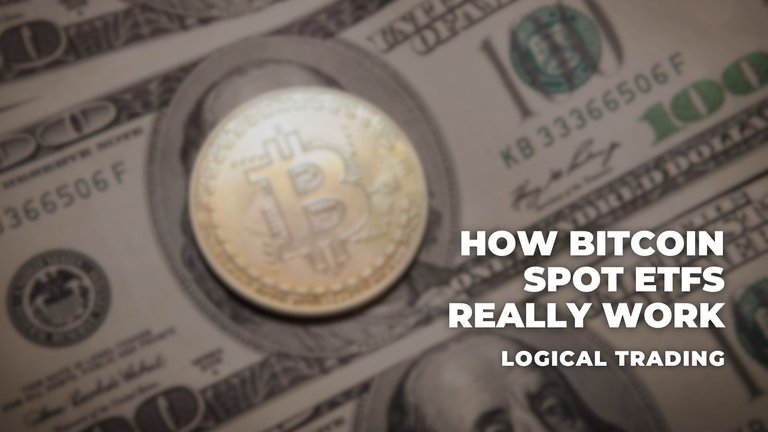
There seems to be a lot of confusion in the cryptocurrency space on how the Bitcoin ETFs actually work. One misconception is that since a major company like Blackrock might run the ETF, they’ll be able to manipulate the market by owning large amounts of Bitcoin. This fear is understandable but not quite accurate. Let the dude clear up the details for you so you can understand exactly how Bitcoin spot ETFs work.
What Is a Spot ETF?
A spot ETF, or Exchange-Traded Fund, is a fund that lets people invest in an asset—in this case, Bitcoin—without directly buying or holding it themselves. Imagine it as a way to invest in Bitcoin on the stock market, where you can buy shares of the ETF just like you’d buy shares of a company. When you invest in a Bitcoin spot ETF, you’re not buying actual Bitcoin. Instead, you’re buying a share in a fund that holds real Bitcoin on your behalf, which in most cases, they don't even hold it...
Who Holds the Bitcoin in a Spot ETF?
When you buy shares in a Bitcoin spot ETF, the fund itself holds the Bitcoin in what’s called "custody," or they contract someone else to do it for them. Out of all of the existing spot Bitcoin ETFs, the only one of the companies that actually manages their own Bitcoin is Fidelity (FBTC). They have been in the Bitcoin space longer than many people realize, in which they have their own in-house mining facility in Texas that they started in 2017. For the rest of them like Blackrock, they contract Coinbase to manage and custody the Bitcoin for them.
This means a company manages and stores the Bitcoin, but it’s not theirs to use however they want. They have strict regulations and guidelines to follow set by the SEC, especially around keeping the Bitcoin secure. The ETF company, like Blackrock, can’t just move Bitcoin around whenever they please. Their job is simply to hold it safely and manage the ETF transactions for their investors.
How the Buying and Selling Works
When someone buys shares of a Bitcoin spot ETF, the ETF provider is required to go out and buy that equivalent amount of Bitcoin on the market to back those shares. If someone sells their shares, the ETF provider will sell the corresponding amount of Bitcoin. This is what keeps the ETF connected to Bitcoin’s real-time price. This doesn’t mean the ETF company has any control over the Bitcoin market, as their role is more like a middleman than a market mover. They respond to demand from ETF investors rather than creating their own.
Common Concerns About Bitcoin Control
Another misunderstood concern I hear from the crypto community is that a big player, like Blackrock, could use a spot ETF to control or centralize the Bitcoin network. If you do even a tiny amount of actual research on how Bitcoin works aside from just what the anons on X are saying, then you will know that it doesn't matter who holds how many BTC coins in their wallet. Bitcoin is not a proof of stake coin, it is a proof of work coin, so the number of full nodes and miners is what matters there. But that is a whole other post for another time.
Why Spot ETFs Don’t Change Bitcoin’s Decentralization
Spot ETFs are simply a bridge for traditional investors to gain exposure to Bitcoin in a regulated, easy way. If someone prefers not to own Bitcoin directly, the ETF lets them gain some exposure through the stock market. Since the ETF provider only buys or sells Bitcoin when ETF shares are traded, this structure doesn’t impact Bitcoin’s decentralized nature. The Bitcoin network itself doesn’t change; it’s just that a portion of Bitcoin’s demand is now coming through these regulated, transparent funds and Wall Street institutions, or simply retail traders and investors that don't want the risk of self-custody and just want exposure to the Bitcoin price.
Wanna get on a path to financial freedom?
Join the Logical Trader's Club on Coin Logic!
Trading Education | Personal Coaching | Real-Time Alerts | Market Analysis | Custom Trading Indicator
Subscribe to me on Inleo!
Subscibe to me for only 5 HBD per month on inleo.io for exclusive trading tips, Bitcoin and Hive alerts, weekly market newsletters and more!
Additional Blog Locations
Many of my cryptocurrency related articles as well as trading articles can also be found on my crypto research site, Coin Logic.
I also post trading chart ideas on my TradingView Profile.
Trade without KYC on the LogicSWAP Exchange!
Click here to trade on LogicSWAP by Coin Logic
Disclaimer:
The information in this trade journal is for educational purposes only and should not be considered financial advice. Please consult with a qualified financial advisor before making any investment decisions.
Posted Using InLeo Alpha
